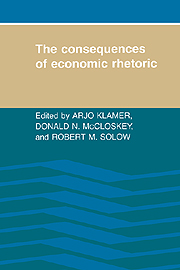Book contents
- Frontmatter
- Contents
- Preface
- The consequences of economic rhetoric
- PART I ECONOMIC RHETORIC: INTRODUCTION AND COMMENTS
- 1 Economics in the human conversation
- 2 Comments from outside economics
- 3 Comments from inside economics
- 4 Rhetoric and ideology
- PART II ECONOMIC RHETORIC: FURTHER ARGUMENTS
- PART III ECONOMIC RHETORIC AMONG ECONOMISTS
- PART IV ECONOMIC RHETORIC IN POLITICS AND JOURNALISM
- PART V ECONOMIC RHETORIC: ITS RHETORIC AND ITS CONSEQUENCES
- 1 Appendix: Other contributors and participants
- Index
3 - Comments from inside economics
Published online by Cambridge University Press: 07 September 2010
- Frontmatter
- Contents
- Preface
- The consequences of economic rhetoric
- PART I ECONOMIC RHETORIC: INTRODUCTION AND COMMENTS
- 1 Economics in the human conversation
- 2 Comments from outside economics
- 3 Comments from inside economics
- 4 Rhetoric and ideology
- PART II ECONOMIC RHETORIC: FURTHER ARGUMENTS
- PART III ECONOMIC RHETORIC AMONG ECONOMISTS
- PART IV ECONOMIC RHETORIC IN POLITICS AND JOURNALISM
- PART V ECONOMIC RHETORIC: ITS RHETORIC AND ITS CONSEQUENCES
- 1 Appendix: Other contributors and participants
- Index
Summary
I must be a person of no particular character. As Klamer and Mc- Closkey described each of their five types of economists a voice kept saying, “That's me; no, that's me; no, no, that's me.” It must have been my own voice: Anyone else would have said, ‘That is I.” What I am is a hopeless eclectic.
Most of you probably think that we eclectics have an easy time of it. No principles to preserve, no purity to protect: The wind bloweth where it listeth and the hopeless eclectic – like me – sayeth whatever he damn pleaseth. You have it all wrong. The life of a conscientious eclectic is hard. He or she must decide every issue on its presumed merits. There are no automatic answers. It's decisions, decisions, decisions. The eclectic has to be alert all the time because you cannot trust true believers. They always tend to go too far. In the army, guard duty used to be two hours on and four hours off; no conscientious eclectic has it so good.
It is that tendency to go too far that causes all the trouble. Let me give you an example not taken from economics but nevertheless not wholly irrelevant to the theme of this conference. In a recent New York Review of Books, Jerome Bruner and Carol Fleisher Feldman (1986) review a recent book by the philosopher Nelson Goodman. As it happens, I admire both the author and the reviewers.
- Type
- Chapter
- Information
- The Consequences of Economic Rhetoric , pp. 31 - 37Publisher: Cambridge University PressPrint publication year: 1989
- 4
- Cited by



